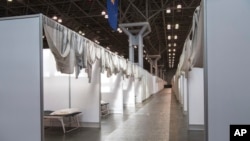The congressional district Lindsey Boylan is running to represent is eerily quiet.
New York’s 10th Congressional District takes in parts of Manhattan and Brooklyn and includes one of the nation’s makeshift hospitals converted to handle the growing coronavirus crisis: the Javits Center.
“You don't see the lights of the city that you would usually see. People really try to be respectful of the shelter-in-place rule, aside from grocery stores,” says Boylan, a former deputy secretary of economic development for Governor Andrew Cuomo who is running as a primary challenger to House Judiciary Chairman Jerry Nadler. “It's just a really quiet, quiet city.”
Boylan is one of thousands of candidates up and down the ballot across the nation who have had to adapt their campaigns to the new realities of self-isolation and shelter-in-place orders.
Online replaces door-to-door
Candidates who usually at this time in an election year would be knocking on doors and holding face-to-face town halls have migrated online to Instagram Lives and Zoom meetings.
Campaigning is always difficult but this dramatic shift is occurring early in a crucial election season that will determine if Democrats retain their majority in the U.S. House of Representatives while Republicans are looking to hold on to control of the U.S. Senate. The makeup of the nation’s legislative body will be determined by these candidates’ success or failure.
“There’s an old saying in electoral politics – there are those that walk and those that lose. You want to get out there and do the door knocking,” says Todd Belt, director of the political management program at the George Washington University School of Political Management.
First-time candidates
The challenge is even greater for first-time candidates like Boylan, who need to increase their name recognition with voters and take on incumbent politicians. While presidential campaigns and high-profile congressional races have media recognition and large staffs, the majority of candidates are operating on much tighter margins.
“A campaign is like a small business that ends on election day,” says Amanda Litman, executive director and co-founder of Run for Something, an organization that helps first-time political candidates. The organization has compiled resources to help those first-time candidates figure out how to move an entire operation including volunteers, events, and information-sharing completely online.
“We're encouraging people to try and replicate the relationships they have with voters, or at least replicate the intimacy. You can’t recreate the way that knocking on someone's door and going into their home really feels. However, we can try and build on that trust and at least try and build some of that trust online,” Litman says.
“We've had to pivot entirely to digital at this point,” Boylan says of her campaign. “But we're doing things every day to accommodate that. So I did my first Instagram Live last night with the only other mom of young children who's running for Congress in New York State.”
Online office hours
Boylan says hundreds of people joined in virtually and that she would begin replicating that experience with online office hours throughout the campaign, answering the flood of questions about federal and state assistance for those impacted by the coronavirus.
“Technology has been a tremendous equalizer in our campaign because I can immediately hear about the issues that are really problematic for people in the community,” Boylan said.
But Belt said interactions on social media do not fully replace the in-person interactions candidates often do in voter town halls and in visits with civic groups as they seek endorsements.
“It’s just not the same thing as being able to talk to people and listen to their concerns and to show your empathy and to explain in detail what your policy proposals are,” he said.
Congressional races also rely on more traditional forms of paid media – the candidate advertisements that run on local radio and television stations. Those ads cost money at a time when campaign fundraising is a tough task for candidates who risk appearing crass during a national emergency
“It's going to be more expensive,” Belt said of the cost of paid advertisements. “Now you have less money coming in. And because the amount of money you have to pay for an advertisement is pegged to the rating that they're getting, the ratings are going to be up because everybody's home. It's going to make it even more expensive at a time of declining contributions.”
Influence of local media has changed
In past election years, candidates have always been able to turn to interviews with local media – from TV appearances talking about local issues to interviews with newspaper editorial boards considering endorsements. Matt Gorman, the former communications director for the National Republican Congressional Committee, notes even this element of campaigning has been changed by the coronavirus.
“It’s extremely rare where not only is national media dominated by a story but local media is as well,” said Gorman. He said he would advise candidates, “Don’t swim against the stream – talk about coronavirus. That’s what people want to talk about, that’s what the press wants to cover but a smart candidate uses that to branch out to other pertinent issues.”
Medical school background a plus
Solomon Rajput is a progressive challenger to Rep. Debbie Dingell, in the Michigan 12th Congressional District, an area identified as one of the national hotspots for the coronavirus. He says his medical school background figured heavily in a recent online town hall with voters.
“Having that health care background, a background in science and recognizing the lack of science in our federal administration and how that has gotten us to the terrible point we’re at,” Rajput said of the concerns conveyed to him by voters.
Rajput had to reassess his campaign strategy of building an army of committed young volunteers who could go out into the community to talk about his concerns about climate change. Now he says his campaign is making the most of the time voters are stuck inside, recruiting for online internships.
Discussions start with coronavirus
Boylan says that in her campaign the consequences of the coronavirus have started discussions with voters about access to testing, hospital overcrowding and the issues created for families now that schools are closed and some students do not have access to computers and other resources.
“Our campaign really had focused on the fact that our district and our communities are the most unequal in the country,” says Boylan. “It's not as if these issues have changed. It's simply that this public health crisis that we're living through really has exacerbated a lot of these problems.”
Boylan says one of her signature campaign issues is receiving more attention lately due to the crisis: access to affordable mental health care. She can still bring those concerns - and the plans she has to address them - to voters.
Like all the candidates on the ballot in this unusual election year, Boylan is finding new ways to campaign in an historically bad situation. Later in the day, she’s booked for a podcast interview on mental health in the time of the coronavirus.






